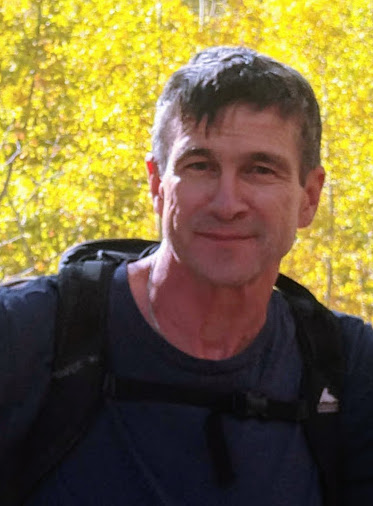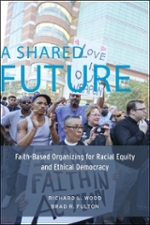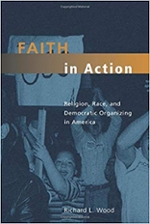Richard L. Wood
Professor

Director of the Southwest Institute on Religion, Culture, and Society
- Email:
- rlwood@unm.edu
- Office:
- SSCI 1104-B
Education:
Ph.D. University of California at Berkeley (1995)
Research Interests:
Religion, Social Movements, Global/Transnational Sociology
Community Organizing, Comparative Civil Societies (United States and Latin America), Culture in Social Movements, Democratic TheoryProfile:
Books:

A Shared Future: Faith-Based Organizing for Racial Equity and Ethical Democracy
Faith-based community organizers have spent decades working for greater equality in American society, and more recently have become significant players in shaping health care, finance, and immigration reform at the highest levels of government.
In A Shared Future, Richard L. Wood and Brad R. Fulton draw on a new national study of community organizing coalitions and in-depth interviews of key leaders in this field to show how faith-based organizing is creatively navigating the competing aspirations of America’s universalist and multiculturalist democratic ideals, even as it confronts three demons bedeviling American politics: economic inequality, federal policy paralysis, and racial inequity. With a broad view of the entire field and a distinct empirical focus on the PICO National Network, Wood and Fulton’s analysis illuminates the tensions, struggles, and deep rewards that come with pursuing racial equity within a social change organization and in society. Ultimately, A Shared Future offers a vision for how we might build a future that embodies the ethical democracy of the best American dreams.
An interview of the authors on the subject of faith leaders organizing for justice (Peace Talks Radio, copyright Good Radio Shows, Inc.) can be heard at this link: https://beta.prx.org/stories/190030
Available for purchase here.

Faith in Action: Religion, Race, and Democratic Organizing in America
Over the past fifteen years, associations throughout the U.S. have organized citizens around issues of equality and social justice, often through local churches. But in contrast to President Bush’s vision of faith-based activism, in which groups deliver social services to the needy, these associations do something greater. Drawing on institutions of faith, they reshape public policies that neglect the disadvantaged.
To find out how this faith-based form of community organizing succeeds, Richard L. Wood spent several years working with two local groups in Oakland, California—the faith-based Pacific Institute for Community Organization and the race-based Center for Third World Organizing. Comparing their activist techniques and achievements, Wood argues that the alternative cultures and strategies of these two groups give them radically different access to community ties and social capital.
Creative and insightful, Faith in Action shows how community activism and religious organizations can help build a more just and democratic future for all Americans.
Available for purchase here.
Recent/Select Publications:
Wood, Richard L., Brad Fulton, and Rebecca Sager. 2023. “Strategic Alliances: The Political Efficacy of Religious-Secular Ties,” multi-method article analyzing the conditions under which religious-secular organizational alliances contribute to or undermine organizational efficacy. Accepted for publication in September 2023 in Mobilization: An International Journal of Social Movements 28(3): xx-xx.
Markofski, Wes, Brad R. Fulton, and Richard L. Wood. 2020. “Secular Evangelicals: Faith-Based Organizing and Four Modes of Public Religion,” in Sociology of Religion: A Quarterly Review 81(2):158-184. doi: 10.1093/socrel/srz045. Download abstract or free access copy.
Yukich, Grace, Brad R Fulton and Richard L Wood. 2020. "Representative Group Styles: How Ally Immigrant Rights Organizations Promote Immigrant Involvement." Social Problems 67(3):486-506. doi: 10.1093/socpro/spz025. Download abstract or free access copy.
Fulton, Brad, Michelle Oyakawa, and Richard L. Wood. 2019. “Critical Standpoint: Leaders of Color Advancing Racial Equality in Predominantly White Organizations,” in Non-Profit Management and Leadership 30(2):255-276.doi: 10.1002/nml.21387. Available here.
Wood, Richard L. 2019. “Passion and Virtue in Public Life: Focal Practices and the Political Holiness the World Needs,” in Political Power and Social Theory, edited by Ruth Braunstein in a special volume titled Religion and Political Polarization: A Force for Humility or Arrogance? Brief version published on The Immanent Frame online scholarly forum. Reprinted in Religion, Humility, and Democracy in a Divided America(Bingley, UK: Emerald Press, edited by Ruth Braunstein).
Faculty Public Sociology & Community Engagement
Richard L. Wood draws on his scholarly expertise in his role on the national Board of Directors of Faith in Action, one of the leading faith-based voices for policy change to benefit working-class and poor communities around the United States
